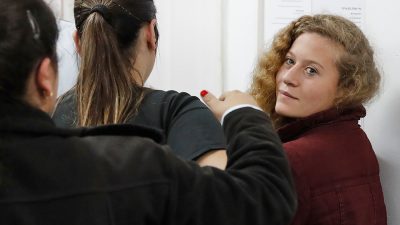Ahed Tamimi Is Part of the Palestinian Generations R – for Return

Featured image: Ahed Tamimi (Source: RT News)
The detention of Ahed Tamimi of the West Bank village of Nabi Saleh, along with her human rights activist mother Nariman Tamimi, for “lightly slapping” an Israeli soldier, as Amira Hass put it in Haaretz, is remarkable only because of the high profile, courage and sumoud (steadfastness) of the Tamimi family, who were featured on the cover of The New York Times Magazine in 2013.
It is a fate shared by thousands of Palestinians. Ahed’s father Bassem, like close to a million Palestinians since 1967, has also seen the inside of an Israeli jail.
Ahed was reacting in frustration to the shooting, by an Israeli soldier, of a 15-year-old Palestinian boy distantly related to her (Mohammed Tamimi). who had just been wounded in the head with a rubber-coated metal bullet and taken to a Palestinian hospital. (See Israelis shoot boy in head, take revenge against his family)
Your question, ‘What do you consider to be justice for Ahed Tamimi?’, raises an important point related to Israel’s military occupation of the West Bank and the legitimacy of the legal system it imposes on Palestinians there (Jewish “settlers”. and Jews in general in the West Bank are governed by a different set of rules).
In the documentary film The Law in these Parts, Israeli military judges and prosecutors have exposed the legal framework and its human impact on Palestinians, young and old.
The egregiousness of this situation in Palestine is being addressed today in US Congress, where a new US bill: Palestinian children’s rights under Israeli military occupation.
Ahed is refusing to answer questions at her interrogation, a clear indication that she does not accept the legitimacy of her detention or the military legal system imposed upon her protest activities in occupied Palestine.
Justice for Ahed Tamimi and all Palestinian political prisoners means their immediate release.
The 2017 Conference on International Law and the State of Israel: legitimacy concluded in its closing statement that
“…while Israel has relied up to date on the use of ‘hard power’, reflecting its geopolitical and strategic alliances on the world stage and notably the support of the USA, in the long term this would not provide a viable and just solution.”
Ahed Tamimi is part of Generations R, if you like, the generations of Palestinians who have not given up on return to their homeland and self-determination – and never will. It’s been reported that 95% of new Palestinian detainees in Israel jails are youth. This youngest generation of Palestinians has proved to be as courageous and steadfast as their legendary elders, including, to name a few, 15 year olds Ibrahim Al-Qawasmi and LouayNashteh from Hebron, Wael Hashash, 19, and AttallahHashash, 24, from Nablus, Ahmed Qassem, 19, from Jenin, and Ahmed Abu Rahma (17) from Ramallah.
Over 6,500 Palestinians, including 300 children, are currently languishing in Israeli prisons.
Rima Najjar is a Palestinian whose father’s side of the family comes from the forcibly depopulated village of Lifta on the western outskirts of Jerusalem. She is an activist, researcher and retired professor of English literature, Al-Quds University, occupied West Bank.

